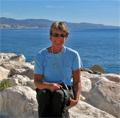 Brain Science Podcast: Do Emotions Make Us Smarter?
Brain Science Podcast: Do Emotions Make Us Smarter?by Dylan Evans Emotion: The Science of Sentiment by Dylan Evans is the featured book for this episode...
 Both Sides Of The Paranormal Debate?
Both Sides Of The Paranormal Debate?Personally I have very little interest in the paranormal or parapsychology, but I have to commend...
 Brain Science Podcast Explores Neuroplasticity
Brain Science Podcast Explores NeuroplasticityIn this week's episode we explore the recent research that has established, contrary to long-standing...
 Brain Science Podcast Discusses Steven Rose's Book, "The Future Of The Brain"
Brain Science Podcast Discusses Steven Rose's Book, "The Future Of The Brain"Show Notes for Episode 9 ...








 Futures in Biotech
Futures in Biotech




